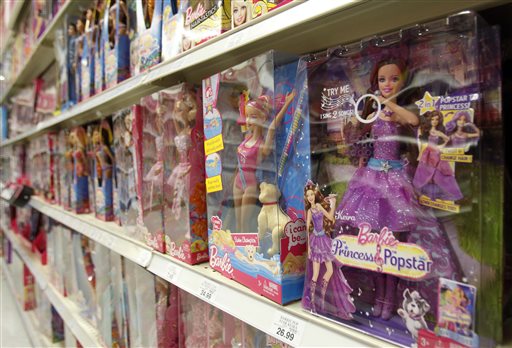(AP) Mattel 2Q profit falls, Barbie sales slide again
By MAE ANDERSON
AP Business Writer
NEW YORK
Vampy teen Monster High dolls are taking a bite out of squeaky-clean Barbie.
Mattel said Wednesday its second-quarter net income fell 24 percent, hurt by a continued slide in Barbie sales and a $14 million write-down on the toy maker’s Polly Pocket line.
Its shares dropped nearly 7 percent Wednesday.
It was the fourth straight quarter of sales declines for Barbie, one of Mattel’s biggest and most iconic brands, and Mattel executives said their Monster High and other girls doll lines were likely taking away some sales from the 54-year-old fashion doll.
Monster High dolls, which are based on teen characters that are offspring of famous monsters, have been a huge hit for Mattel since they were introduced in 2010. Monster High sales have likely grown to more than $500 million in just three years of existence, while Barbie annual sales are about $1.3 billion, estimates BMO Capital Markets analyst Gerrick Johnson.
Other doll lines including American Girl and Disney Princesses have been performing well too.
“We’ve introduced new franchises that have fueled significant category growth for the industry,” said CEO Bryan Stockton “The Barbie brand is likely being modestly impacted by their successes.”
But Stockton noted that Barbie was still the largest doll brand and its sales are still higher than when Monster High was introduced in 2010.
He also said Barbie sales will likely pick up in the second half of the year when shipments of new products increase in time for the holiday season _ which the company dubs “the season” _ and the other three quarters of the year that it calls the “preseason.”
To mirror consumer fascination with all things digital, new Barbie products have taken on a distinctively techy tone: Holiday offerings include a $49.99 Barbie train and ride horse, which features an interactive horse; $69.99 Barbie Digital Makeover Mirror, which turns an iPad into an interactive mirror; and $49.99 Barbie Digital Dress Doll that features LED and touch screen technology, letting girls customize Barbie outfits digitally.
Toy industry sales have been in slight decline all year, hurt by cautious consumer spending, a video game industry slump and increased demand for electronic gadgets like smartphones and tablets. And while Mattel, the largest U.S. toymaker, usually outperforms its rivals, the latest results show it is not immune to industry-wide declines.
Stockton said the results reflect a $14 million asset impairment charge related to its Polly Pocket line as well as investments made to help the company grow in the future, investing in American Girl stores, and expanding in Russia and China.
In the April-to-June quarter, Mattel’s net income dropped to $73.3 million, or 21 cents per share. That compares with $96.2 million, or 28 cents per share, a year ago.
Mattel didn’t specify what it earned excluding unusual items. Analysts expected earnings of 32 cents per share but typically exclude unusual items from the estimates.
Revenue for the El Segundo, Calif., company edged up to $1.17 billion from $1.16 billion as international sales grew. Still, this missed Wall Street’s estimate of $1.22 billion.
North American sales fell 2 percent, while International sales rose 4 percent.
Sales of Mattel’s Barbie franchise declined 12 percent in the latest quarter. Sales of the company’s other girls brands climbed 23 percent, mostly due to the continued popularity of Monster High products.
One bright spot was Mattel’s American Girl line, with sales up 14 percent. Sales of Fisher-Price branded products dropped 3 percent, while Hot Wheels sales dipped 1 percent.
Mattel Inc. said Wednesday that its board declared a third-quarter dividend of 36 cents. The dividend will be paid on Sept. 20 to shareholders of record on Aug. 28.
Mattel shares dropped $3.17, or 6.8 percent, to close at $43.16 Wednesday. They are 11 percent below their high of $48.48 set in mid-May. They traded as low as $33.84 last July.
A more complete picture of how the toy industry is doing will come when Mattel’s smaller rival, Hasbro Inc., reports on July 22.

COMMENTS
Please let us know if you're having issues with commenting.